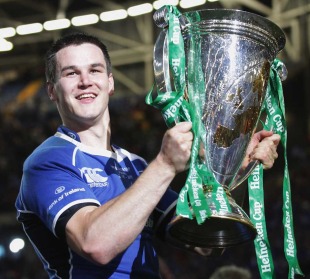|
Comment
Leinster's best Lazarus impersonation
John Taylor
May 25, 2011

Leinster's Jonny Sexton was inspirational as they won the Heineken Cup
© Getty Images
Enlarge
It may have paled in comparison to Lazarus' comeback, but Leinster's second-half performance against Northampton in last weekend's Heineken Cup Final was certainly the most astounding turnaround since the Rugby World Cup semi-final at Twickenham in 1999. For those who missed it (or have short memories), New Zealand, the red hot favourites to win the tournament, were leading France 24-10 and all set to pull away further. Instead, the French threw caution to the winds and scored 33 points to the All Blacks' seven just after the break. New Zealand were devastated and eventually lost 43-31. It is not often you get such a reversal in rugby - once the forwards have established supremacy the pattern of the match is usually set - and that it makes it all the more wonderful when it does happen. At Twickenham it was the sheer brilliance of France's attacking back play, allied to the telling kicking of Christophe Lamaison. In Cardiff it was even more remarkable because the Leinster pack managed not just to salvage a lost cause against a Northampton eight that had been rampant in the first half - they completely turned the tables. That is something that almost never happens. Jonny Sexton apparently made an impassioned half-time speech that fired up his teammates - especially the old guard - and that made the difference. It is no coincidence that Leinster had six players over 30 in their starting XV - Northampton just one. They simply fell apart in the second-half and their 25-year-old captain had no experienced advisers to help him when he desperately needed help with his leadership. The comparisons with 1999 stop right there. I was commentating on that match with Steve Smith and during a rare lull in that explosive second-half we were wondering what had inspired the French. We assumed somebody had given a rousing half-time speech - a sort of Agincourt in reverse - but our reporter in the tunnel soon put us right. "I can tell you Philippe Bernat-Salles (the grey haired winger who had just scored the third try) was certainly not inspired by any speech," he said. "He spent less than 30 seconds in the changing room before coming out into the corridor where he spent the rest of the break smoking." A different sort of 'come back' with a 'please' on the front might be the result of the RFU management board meeting - when the Sir Clive Woodward fiasco will be top of the agenda. I still cannot fathom how John Steele managed to mess-up so spectacularly - this was the man who arrived last autumn as a moderniser with a great reputation for business restructuring and man management, honed during his apprenticeship at Sport England - but I do not believe Woodward has totally turned his back on English rugby. He is a very good politician and can use this debacle to strengthen his position. There are no other heavyweight candidates - unless they start again from scratch and can rekindle interest from the likes of Eddie Jones - and the job is tailor made for Woodward. Only the real insiders know the full story, but Steele has an awful lot of explaining to do and if someone with his ear as close to the ground as Fran Cotton believes his position is untenable it may well be so. He has become less and less impressive as this has unfolded and his assertion in last week's memo to the board that "we have successfully run seven out of eight recruitment processes" smacks of desperation. Having promised earlier to "scour the world" for the "outstanding candidate" the RFU would look extremely foolish if they were to appoint either of the two candidates officially still in the running. If I were Stuart Lancaster or Hugh Morris I would withdraw immediately. I am sure both have great qualities but they do not have the pedigree for this job and would be mad to take it with the Woodward mill-stone hanging round their neck. There is also Woodward's position at the British Olympic Association (BOA) to consider. His role up to and including the 2012 Olympics is clear but there is no guarantee his current job will even exist after that. A number of sports believe they already have very good elite performance directors. We all know the BOA has financial problems so a big saving after next year would be most welcome. It all points to Woodward joining the RFU but probably later rather than sooner. © ESPN Sports Media Ltd.
|
Live Sports
Communication error please reload the page.
-
Football
-
Cricket
-
Rugby
-
- Days
- Hrs
- Mins
- Secs
F1 - Abu Dhabi GP
Abu Dhabi Grand Prix December 11-131. Max Verstappen ()
2. Valtteri Bottas (Mercedes)
3. Lewis Hamilton (Mercedes)
4. Alexander Albon ()
5. Lando Norris ()
6. Carlos Sainz Jr ()
-
ESPNOtherLive >>
Golf - Houston Open
Snooker - China Open
Tennis - Miami Open

